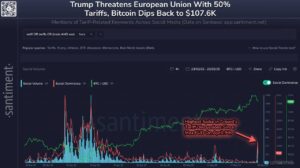Trump Tariff Threat Sends Shockwaves Through Markets, Bitcoin Drops Over 3%
In a surprising and bold move, former U.S. President Donald Trump has announced plans to impose sweeping new tariffs if re-elected, threatening a 50% levy on European Union imports and a 25% tariff on Apple iPhones manufactured overseas. The announcement triggered immediate market reactions, including a sharp dip in Bitcoin’s value, which fell more than 3% from its recent all-time high of $112,000.

Tariff Talk Rattles Global Markets
Trump’s comments came during a high-profile campaign event, where he emphasized the need to “protect American industry” and reduce reliance on foreign manufacturing. The proposed tariffs, if implemented, would mark a significant escalation in trade tensions with both the EU and global tech giants like Apple.
The suggestion of a 25% tariff on Apple iPhones, which are primarily assembled in China, has raised concerns among investors about potential disruptions in the global supply chain. Apple, one of the most valuable companies in the world, could see price hikes, lower profit margins, and reduced consumer demand if such tariffs were enforced.
Bitcoin Reacts to Global Economic Uncertainty
The cryptocurrency market, particularly Bitcoin, reacted swiftly to the uncertainty. After soaring to a record high of $112,000 earlier in the week, Bitcoin tumbled more than 3% following Trump’s announcement. Analysts suggest that the dip reflects investor concerns over potential economic instability and the possibility of reduced risk appetite in the near term.
While Bitcoin is often viewed as a hedge against inflation and geopolitical tension, sudden shifts in global economic policy—especially those involving trade wars—can inject volatility into crypto markets.
What This Means for Investors
The market’s reaction highlights the sensitive balance between economic policy and investor sentiment. With the 2024 U.S. presidential election drawing closer, financial markets are likely to remain volatile as candidates outline their economic agendas.
For crypto investors, Trump tariff threat serve as a reminder that even decentralized assets are not immune to global policy shifts. As always, diversification and risk management remain key strategies in navigating these uncertain waters.
Conclusion
Trump’s aggressive trade stance may play well with some voters, but it has already sent ripples through both traditional and digital markets. As the political landscape continues to evolve, investors will be watching closely—not just for who wins the election, but for how their policies could reshape the global economy.









